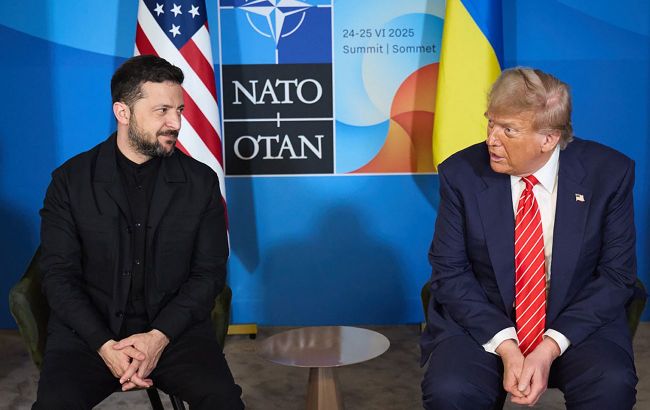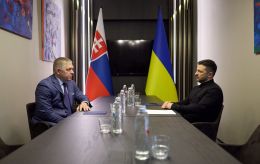Is Trump changing course? Criticism of Putin, weapons for Ukraine, and new sanctions coming
 Volodymyr Zelenskyy and Donald Trump (photo: Office of the President of Ukraine)
Volodymyr Zelenskyy and Donald Trump (photo: Office of the President of Ukraine)
The United States is resuming arms deliveries to Ukraine, and President Donald Trump is suddenly shifting his rhetoric toward Russia and its leader.
RBC-Ukraine explains whether this signals a sharp turn by the White House on the issues of the Russia-Ukraine war.
Key questions:
-
What’s behind Trump’s change in rhetoric on Russia?
-
Why did the US suspend military aid to Ukraine, and has it been resumed?
-
What actions by Trump would confirm a real break with Russia?
"We get a lot of bullsh**t thrown at us by Putin, if you want to know the truth. He's very nice all the time, but it turns out to be meaningless," Trump said on the evening of July 8. Unsurprisingly, this revelation from the American President sparked plenty of irony across Ukrainian social media: apparently, it took the US leader about six months to realize that Putin had been stringing him along all this time.
However, this wasn’t an isolated remark. Over the past few weeks, Trump’s public dissatisfaction with the Kremlin’s actions has become increasingly noticeable, fueling hopes for some real action from the US, beyond calls to make a deal. At the same time, the still unclear story of the suspended American military aid has raised concerns that Trump’s rhetoric may once again have been misinterpreted.
Earlier this summer, it seemed that the negotiation process to end the Russia-Ukraine war had completely stalled, and that Trump had no intention of reviving it. Through significant effort, Ukraine managed to convince the US that President Volodymyr Zelenskyy really wants peace, and that there’s no justification for imposing restrictions against Ukraine, such as halting military aid or cutting off intelligence sharing.
Meanwhile, Trump persistently refused to use force against Russia or even to suggest it. Russia, for its part, made it clear it had no intention of ending the war, escalating further on the frontlines, and intensifying strikes on Ukrainian cities. Because of this, most of RBC-Ukraine’s sources — both Ukrainian and international political and diplomatic contacts — held a rather pessimistic outlook for any breakthrough in negotiations, at least until autumn. So, the shift in the US President’s position and that of his inner circle have come as a surprise.
Words and legislation
So far, the most noticeable changes have come at the level of Trump’s rhetoric. A turning point in this regard was his phone call with Putin on July 3. Judging by statements from Russian officials, Putin continued to push his usual line of faking negotiations. As a result, Trump said afterward that he was dissatisfied with Putin’s stance on the war and had made no progress with him.
In later comments, the US President added even more criticism of the Russian leader, which is when his remarks about Putin’s "bullsh**t" began to appear. However, when asked about potential sanctions against Russia, Trump gave his usual vague answer: "I wouldn’t be telling you. Don’t we want to have a little surprise?"
Another sign that could indicate a shift in the US President’s position is the progress on a sanctions bill targeting Russia. The legislation was introduced in the US Senate back in April, at a time when Trump showed no interest in applying pressure on Russia. The bill proposes a range of restrictions against Moscow, including a 500% tariff on countries that purchase Russian oil, gas, uranium, and other raw materials.
Still, senators were in no rush to bring it to a vote, clearly taking Trump’s stance into account and likely waiting for a green light from the White House. However, since the beginning of this month, the bill’s lead promoter, veteran Republican Senator Lindsey Graham, has suddenly stepped up his efforts, likely sensing a shift in the political mood. He has announced that the Senate will consider the bill as early as this week.
The most high-profile and still largely unclear story, however, remains the matter of US weapons supplies to Ukraine.
Chaos in the Pentagon
On July 2, just a day before Trump’s phone call with Putin, several American media outlets reported that the US Department of Defense had suspended military aid to Ukraine and other countries, citing an ongoing audit.
The news came as a surprise to Kyiv. In Ukrainian political circles, several theories began circulating about what had happened: an attempt by Trump to "sell out" Ukraine to Putin to finally strike some kind of deal, behind-the-scenes maneuvering within the US President’s inner circle, and the audit itself, which the Pentagon cited as the official reason.
As events unfolded, the truth appeared to lie somewhere between the second and third theories. The suspension caught many in the White House off guard as well. A source in the White House told the Associated Press that Trump was blindsided by the announcement of the aid freeze. According to three individuals familiar with the matter, the decision was not properly coordinated with the White House.
CNN reported that the suspension was directly ordered by Defense Secretary Pete Hegseth, but had been recommended by his deputy, Elbridge Colby. Colby advocates for shifting US resources from Ukraine to the Indo-Pacific to counter China. With deep experience in government service, Colby is also able to impose certain decisions on his boss, Hegseth, who is a former television host.
According to Politico, there are no disagreements between Hegseth and Colby on policy. However, in private conversations, Hegseth has reportedly accused Colby of setting him up by pushing initiatives without proper coordination. One source told the outlet that Colby, due to his prior Pentagon experience, manipulates bureaucratic processes, while Hegseth does not have enough experience and relies on his recommendations.
Ultimately, after a call with President Zelenskyy, Trump announced the resumption of US arms deliveries to Ukraine. However, it remains unclear which specific aid packages this applies to. According to Trump, the United States will first provide Ukraine with defensive weapons to help protect its citizens.
"Putin is not treating human beings right. He's killing too many people. So we're sending some defensive weapons, and I've approved that," the US President stated.
Ironically, unjustified suspension of supplies may have even played in Kyiv's favor to some extent, drawing sharp criticism not only from opposition Democrats and European leaders, but also from many of Trump’s Republican allies.
"Sometimes, reaching the right decisions requires the crisis to hit its peak. The halt in weapons deliveries triggered a strong response from European leaders, American political elites, and, of course, Ukraine. And this accelerated the placement of the right accents on who Putin is," Mykhailo Podolyak, adviser to the head of the Office of the Ukrainian President, said in a commentary to RBC-Ukraine’s YouTube channel.
What’s more, Trump is now considering sending an additional Patriot missile defense system to Ukraine, according to The Wall Street Journal. The White House has tasked the Pentagon with preparing options for more military aid, while also exploring the possibility of engaging allies to send additional Patriot systems to Kyiv.
Reasons for the shift
It is not easy to understand the reasons for Trump's tougher rhetoric toward Putin, but a combination of external and internal factors may have played a significant role in this situation, said Volodymyr Dubovyk, Director of the Center for International Studies at Odesa National University, in a comment to RBC-Ukraine.
"I think that there is an element of irritation because every conversation between them (Trump and Putin - ed.) is Trump calling for peace, but at the same time, Russia continues, even intensifies, its attacks on Ukraine. This puts Trump in an awkward position. More and more people are calling him weak in this context. And that’s something he can’t tolerate, because above all, Trump values his ego. Just the other day, he said something similar on another issue — that he doesn’t know whether it would be good for Republicans, but what matters is that it would be good for him," Dubovyk noted.
In addition, effective communication with Trump also played a role. The key event here was the NATO summit on June 24–25. During the summit, leaders of European NATO members openly flattered the US President and tried to win him over by agreeing to increase defense spending. There was a successful meeting between Trump and Zelenskyy on the sidelines of the summit.
"I also think that in The Hague, he heard many calls to action from key NATO partners. Trump, of course, is known for sometimes ignoring their opinions, but in this case, it’s possible that the European chorus had an effect, just like the conversation with Zelenskyy, who remains a skilled communicator," Dubovyk said.
Still, despite all these public signals, a real shift in Trump’s position can only be judged by whether he actually imposes new sanctions against Russia and applies other forms of pressure on Russia. And the chances of that have been increasing recently.
"Trump is gradually coming to the conclusion that Russia is not capable of making agreements. One way or another, Putin is undermining Trump himself, and the only way to achieve anything with Russia is through pressure," emphasized Mykhailo Podolyak.
However, it will still take some time to reformat US policy. Especially since Russia is likely to continue trying to push its narratives on Trump, including through people in his inner circle who are sympathetic to Moscow.
Sources: statements from US politicians, materials by CNN, Politico, and The Wall Street Journal, as well as commentary from Mykhailo Podolyak and Volodymyr Dubovyk

